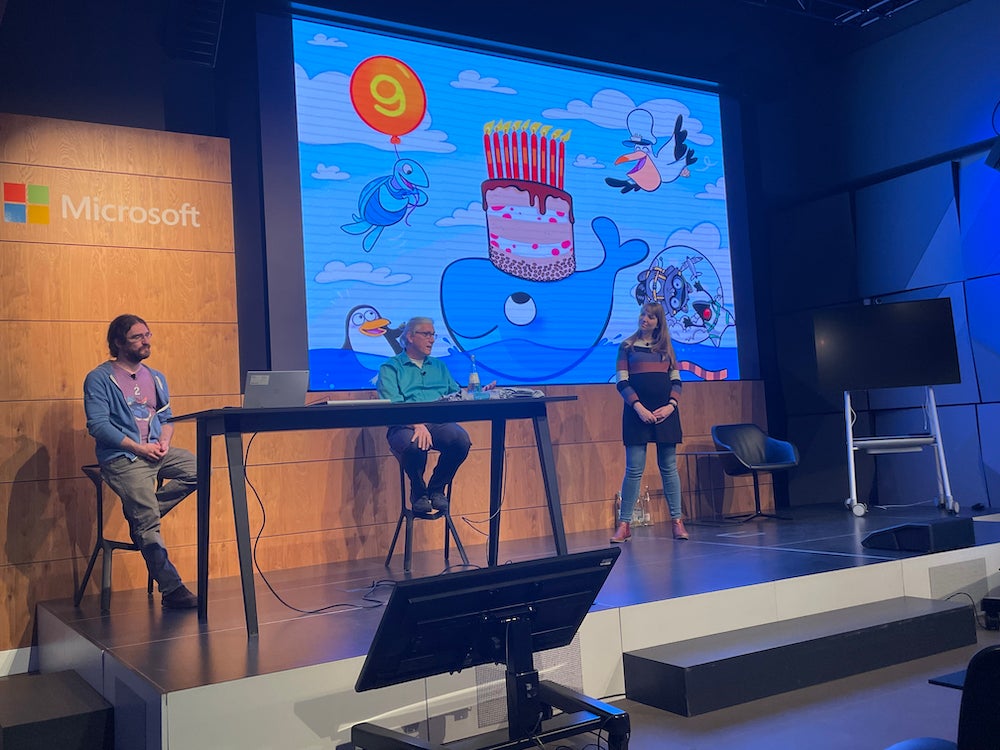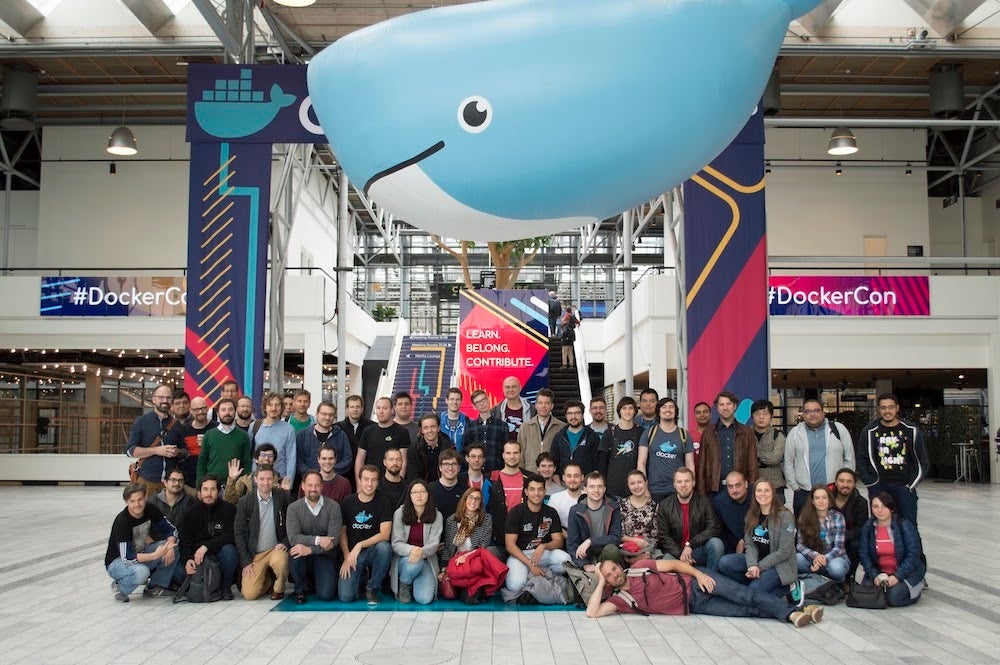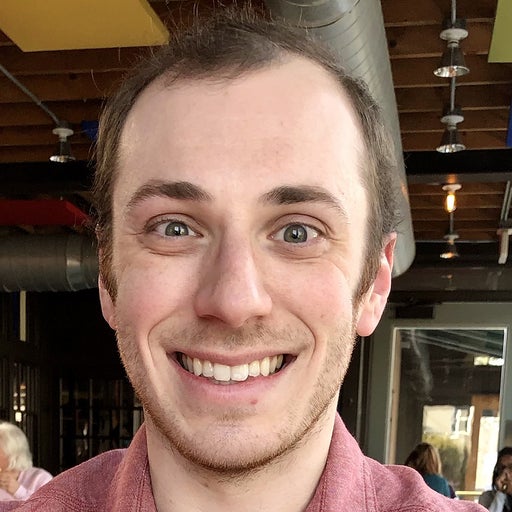The tl;dr? We love our community to pieces, and are humbled to witness such free exchanges of development best practices. Read onward to see what you missed, and learn from Docker’s most passionate community members.
Our fifth-ever Docker Community All Hands event has officially come to a close! We couldn’t be more thrilled about your enthusiasm, and willingness, to share your tricks of the trade for using Docker with today’s leading programming languages. We owe you a tremendous round of applause for tuning in! 👏
Community All Hands #5 featured quite a diverse group of attendees. Viewers from at least 100 countries joined our live chats and meeting rooms. There was plenty of chatter, and it was awesome to see everyone interact throughout the proceedings. Our event even hosted 2,158 live attendees — doubling the attendance of our previous Community All Hands!
However, we missed those of you who weren’t able to make it. From Docker-related announcements, to buzzworthy community milestones, to our tech talks, there was plenty to soak in.
Docker Turns Nine!

Nine years have officially passed since we set sail in 2013. This year’s Community All Hands was an incredible milestone for Docker in many ways, yet it also gave us the opportunity to appreciate our development community’s numerous contributions. CEO Scott Johnston shared some facts demonstrating how far we’ve come together:
- Nearly 11 million Docker developers are registered worldwide
- Our community has built over 13.7 million images, which are found on Docker Hub
- Our users hail from over 200 counties
- Developers download Docker Engine over 35 million times monthly
In the past year, we’ve also released over 7,000 features, updates, and fixes across our various platforms. Docker Compose has specifically gained immense popularity. Fifty-eight percent of developers use it to build cloud-native applications. That uptake is incredible, and we’re working hard to provide frictionless user experiences across all tools. Which brings us to….
Quick Docker Roadmap Updates
We’re working on some cool new projects in 2022 to improve platform-wide developer experiences. Your feedback through GitHub, community channels, and other social outlets has been pivotal in helping us prioritize our development goals. Docker Desktop in particular has emerged as an essential tool for developers of all skill levels.
Consequently, we’re doubling down on bringing new enhancements to Docker Desktop. Our latest point release, Docker Desktop 4.6 for Mac, greatly improved file-sharing performance by introducing virtiofs. Virtiofs also allows you to unlock up to 98% faster filesystem performance using macOS. Anyone performing MySQL imports, large codebase composer installs, or Typescript app boots (among other things!) will greatly benefit. This was your #1 request on our public roadmap.
Docker Desktop for Linux
Next, we’re tackling our second most-requested feature: Docker Desktop for Linux (DD4L). Linux is one of today’s most popular operating systems for developers. And since Docker Desktop is growing rapidly, we’re thrilled to finally deliver a consistent user experience to Linux users after months of development. DD4L is currently in beta. We’d love for you to give it a try and share your feedback!
Introducing Docker Extensions
Community All Hands also hosted our initial walkthrough of Docker Extensions! Docker Extensions will unlock new tools and automations to help streamline common developer workflows. Built by Docker and our ecosystem partners, Extensions will boost productivity by keeping you within Docker Desktop — instead of jumping between workspaces. We’ll also be releasing an SDK, so you can build brand new workflows for yourself and your team.
To learn more about Docker Extensions, check out our preview blog or watch our Community All Hands presentation!
Our Community Spotlight
The Docker community is huge, and we’re thrilled to announce that it’s growing even larger. The developers and companies who use Docker have been hitting the airwaves—and we’re truly lucky to have such strong support. The energy surrounding Docker is infectious, and it shows!

Applications are now open for Docker’s Community Leaders Program, which focuses on the following:
- Product sneak peaks and exclusive content
- Professional growth
- Community mentorship
- Direct collaboration
- Recognition
- Events support
The latter will become especially important as we transition to post-pandemic life. Community Leaders are global volunteers — passionate about Docker and application development — who often organize engaging, in-person meetups. Docker Community Leaders even helped organize our recent birthday celebration in Berlin (with cake involved)!
Additionally, we’re happy to onboard a number of new Docker Captains. These technically-minded members of the Docker community don’t necessarily work at Docker, but harness our platform regularly — either personally or through their organizations. Captains are some of our community’s most helpful and enthusiastic members. We couldn’t be more jazzed to welcome them.
Last, but not least, Community All Hands highlighted the open-source contributions of key community members. We owe special thanks to Aurélie Vache, Konstantinos Tsanaktsidas, Paul Hampson, and Ákos Tákacs (and others!) for their tireless efforts. Through crafting helpful content, boosting Docker’s macOS performance, improving Windows CLI syntax, or supporting Community forums — respectively — you’ve all made strong impacts.
Engaging Tech Talks and Speaker Sessions
After hitting the main stage for Docker and community announcements, we shined the spotlight onto our amazing presenters. Community All Hands featured speakers from numerous backgrounds, both personal and professional. Viewers followed along with current Docker Captains, Docker Community Leaders, OSS members, and other platform veterans. We welcomed some fresh faces, and their enthusiasm permeated every live chat.
For three hours, 19 speakers shared their knowledge and experience in sessions ranging from 15 to 30 minutes. Attendees could freely move between virtual rooms and view presentations at their leisure. We split these tech talks between four different tracks according to subject matter:
- #Python
- #JavaScript
- #Java
- #Deep-Dive
We also learned that you really love Python — and we do too! It was our most-popular track, though the others were pretty hot on its heels. Let’s break those tracks down now.
Hopping into Python
The topic lineup for the Python track was incredibly diverse — featuring discussions on anything from Docker packaging best practices to running Tensorflow machine learning upon Docker.
Itamar Turner-Trauring kicked off the festivities by diving into development best practices. Sharing how to bring Python applications to production readiness from square one, Itamar’s session touched on the inherent, ever-evolving complexities of packaging.
He also touched on the DevOps pipeline’s influence upon development, testing, and debugging. Drawing from his personal list of over 70 best practices, Itamar showed us how to quickly build a packaging framework with basic resources.
Later, we listened as Patrick Loeber took us on a containerization journey within Visual Studio Code — demonstrating how to effectively Dockerize basic Python apps and scripts. Patrick also showed attendees how to create a Python web app within a virtual environment. Using Dockerfiles, images, and containers, Patrick shared his essential tips for success.
His user-friendly approach to harnessing the Terminal was also a cornerstone of getting these applications up and running. Additionally, he also hopped into Docker Desktop to manage his existing containers with greater ease.
Jumping into JavaScript
Like the Python track, the JavaScript topic lineup was highly varied. Our speakers touched on everything from environmental databases, to using Docker with Monorepo, to incorporating ReactJS and Next.js with Docker projects. Since JavaScript is the world’s most popular programming language, users were chomping at the bit to learn more.
After some excellent opening sessions, it wasn’t long before Armagan Amcalar walked users through the process of building and deploying Next.js applications using Docker. Next.js is particularly suited for Docker development, since it’s deployable via any Docker-compatible hosting provider. This type of implementation has mass appeal for backend developers.
Armagan shared how Next.js features were advantageous to web development. He highlighted static generation, server-side rendering, code splitting, API routes, and the overall developer experience. User friendliness has become a Docker staple, so the two technologies are aligned philosophically and technically. Armagan also noted the importance of security and user roles while running Dockerized applications.
Making JavaScript’s afternoon curtain call, Nelson from Amigoscode later demonstrated how to build full-stack Python and ReactJS applications using the FastAPI framework. Nelson touted the framework’s performance and user friendliness as major advantages.
He soon described the process of taking a Dockerfile, using a compatible container image, and pairing them with a frontend application that consumes backend data. Next.js comes into play while building frontend JavaScript applications. Nelson also shared how JSON alterations can impact your final build.
Diving into Java
Though our Java speaker lineup was the smallest by a hair, the content remained mighty. Melissa McKay jump started the conversation in spectacular fashion—guiding beginners and intermediate developers alike on containerizing Java applications. Melissa aimed to give users a solid foundation for using Docker with Java, and her conversational style resonated with viewers.
Nicolas Fränkel, a Docker advocate, also shared his own demo for containerizing Java applications. He highlights Java’s unique containerization challenges compared to scripting languages like Python and Node. “…in Java and other languages, you first need to compile your source…[conversely] with scripting languages, what you see is what you run,” he states.
By first writing your application outside of Docker and then “wrap” Docker around it. He breaks down multiple development proposals — including multistage builds, using Jib, layer-aware builds, using Buildkit, using Buildpack, and exploring Spring Boot Maven plugins. According to Nicolas, your use cases will influence your strategies.
Dazzling Deep Dives
Finally, our deep-dive sessions catered to a wide range of audiences, though the concepts could still provide value to experienced developers. Covering everything from MiCADO, multi-cloud Docker container management to Immcantation, our presenters touched on unique subjects that are highly relevant.
While all presenters were impressive, Bret Fisher’s talk on Docker CI/CD automation caught our eye. Bret focuses primarily on widespread build, test, and ship processes that impact most developers. Throughout his talk, Bret assessed DevOps automation platforms, automation design, and focused much of his attention on Docker-centric workflows. He also highlighted how bash scripting is giving way to new plugin systems.
If you’re interested in how Buildkit, multi-platform support, metadata, PR commits, CVE scanning, testing, and more can impact your automation implementation, then Bret’s session is the perfect starting point.
Looking Ahead
This March’s Community All Hands was one of our most successful yet. Following along with our development community was a blast, and attendees from across the experience spectrum gleaned plenty of value. We want to extend another huge thank you to all who participated!
That said, our next Community All Hands is giving way to DockerCon 2022 — our annual event where thousands of developers can discover, learn, and better excel within their roles. You’re invited to register for this virtual, two-day event for free. Follow along with our panel discussions, hacks, deep technical sessions, and breakout sessions. You can also join the conversation live with other developers.
While we’ve showcased some interesting talks, that’s only the tip of the iceberg! Our other presenters have shared a wealth of knowledge. To catch up on other talks you missed, swing by our official Docker YouTube channel where each session is posted. Also remember to subscribe to see more of this in-depth content as it becomes available. Thanks so much, and we look forward to seeing you again soon! 🐳
DockerCon2022
Join us for DockerCon2022 on Tuesday, May 10. DockerCon is a free, one day virtual event that is a unique experience for developers and development teams who are building the next generation of modern applications. If you want to learn about how to go from code to cloud fast and how to solve your development challenges, DockerCon 2022 offers engaging live content to help you build, share and run your applications. Register today at https://www.docker.com/dockercon/

